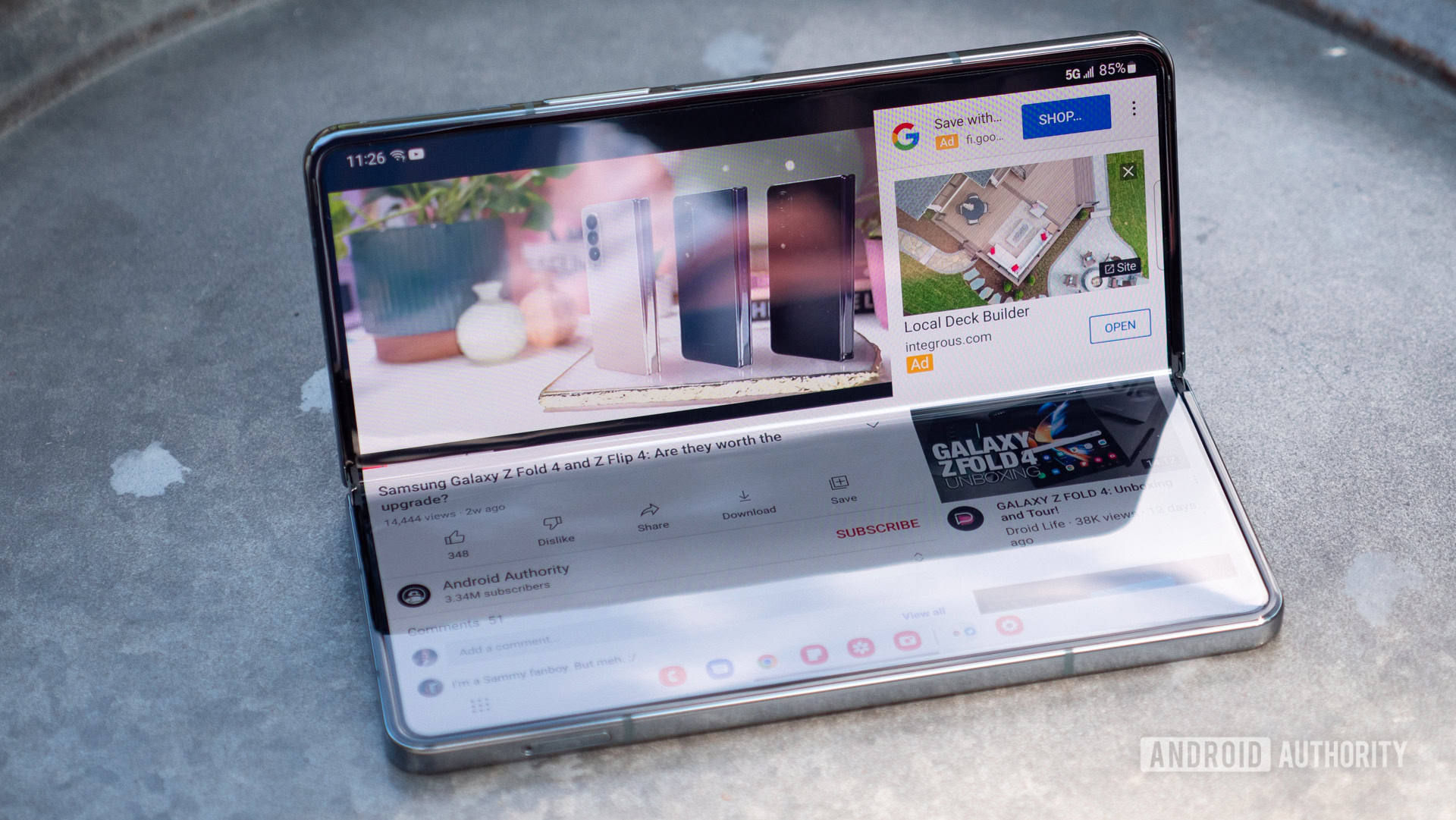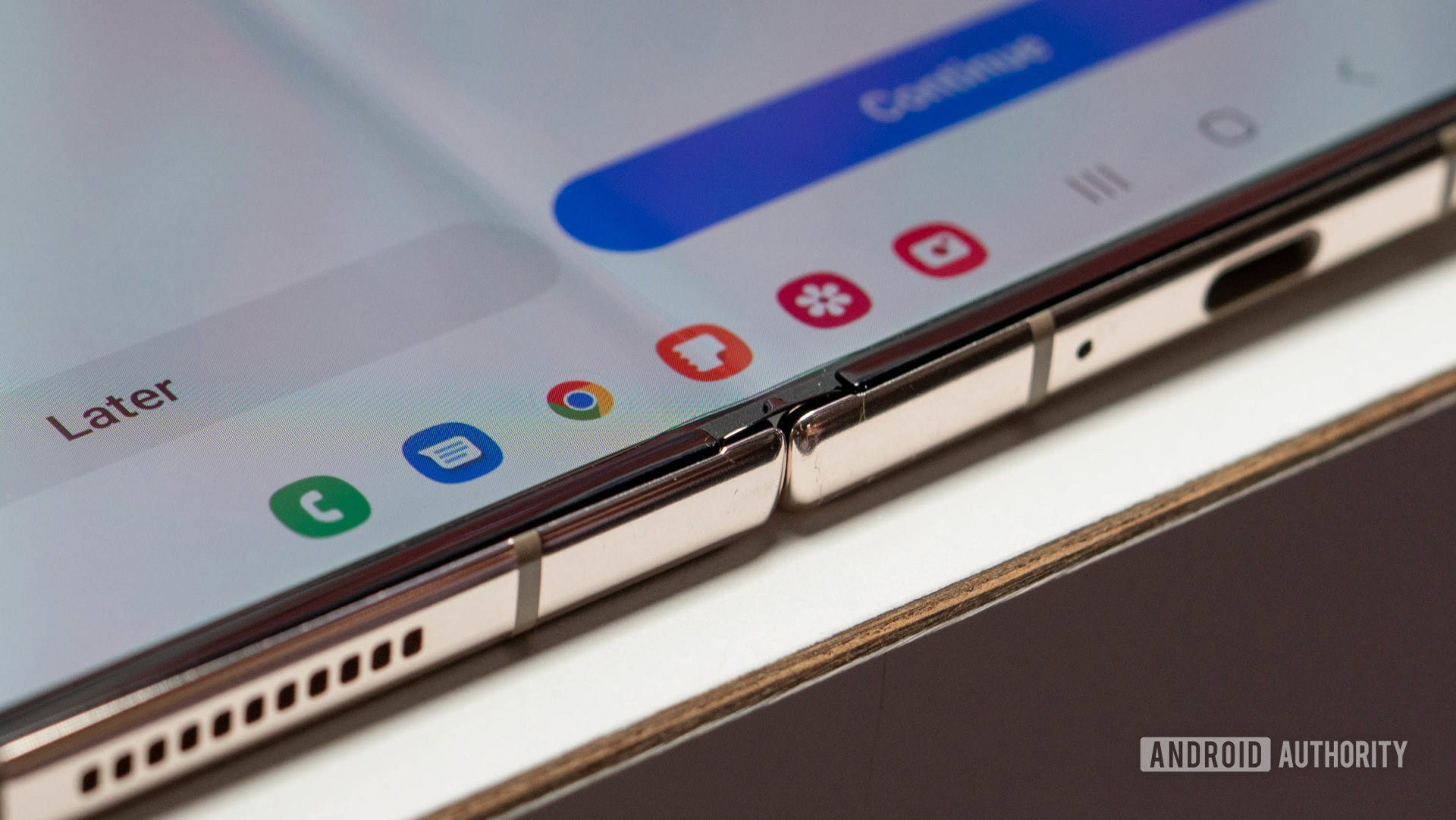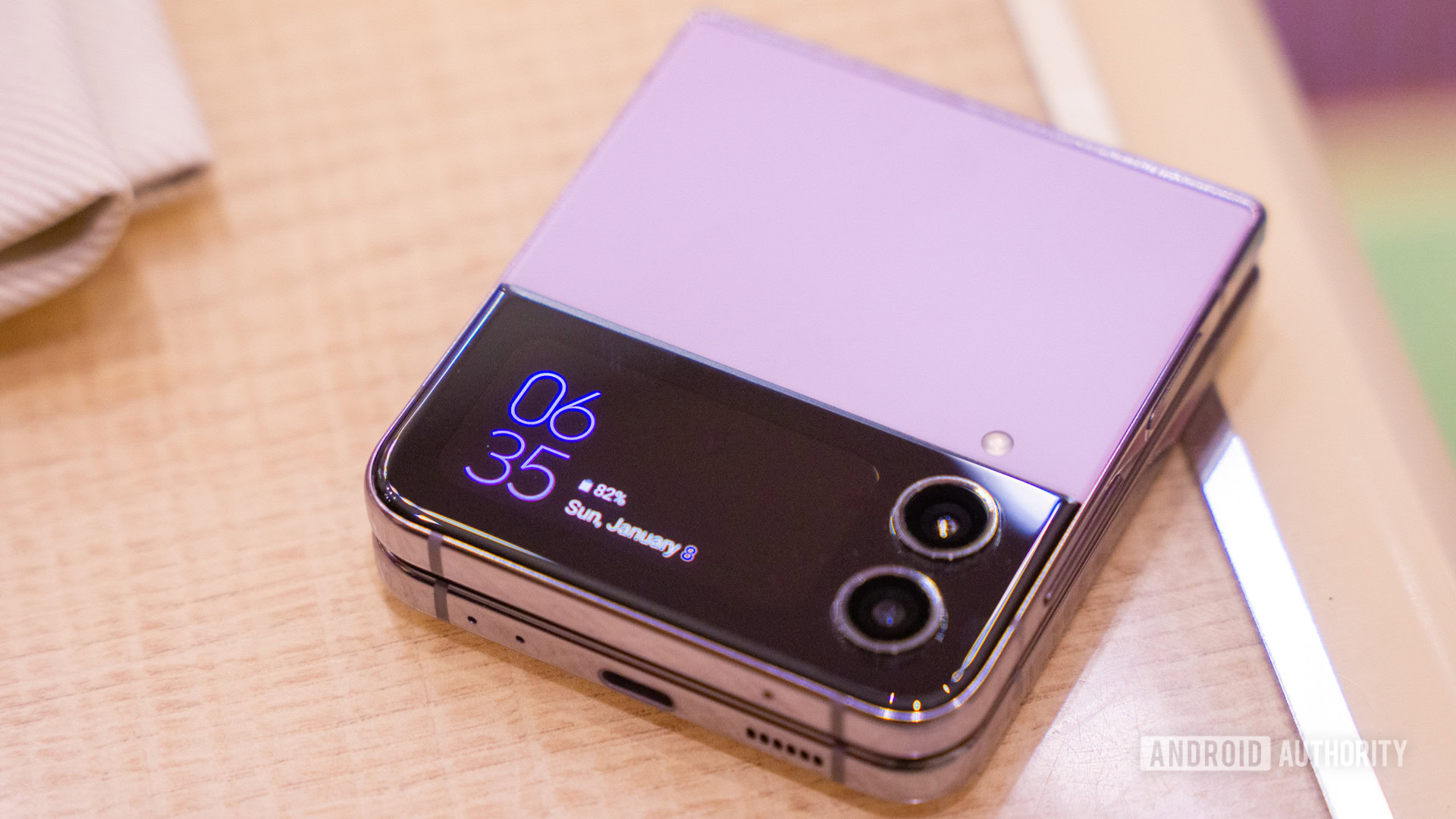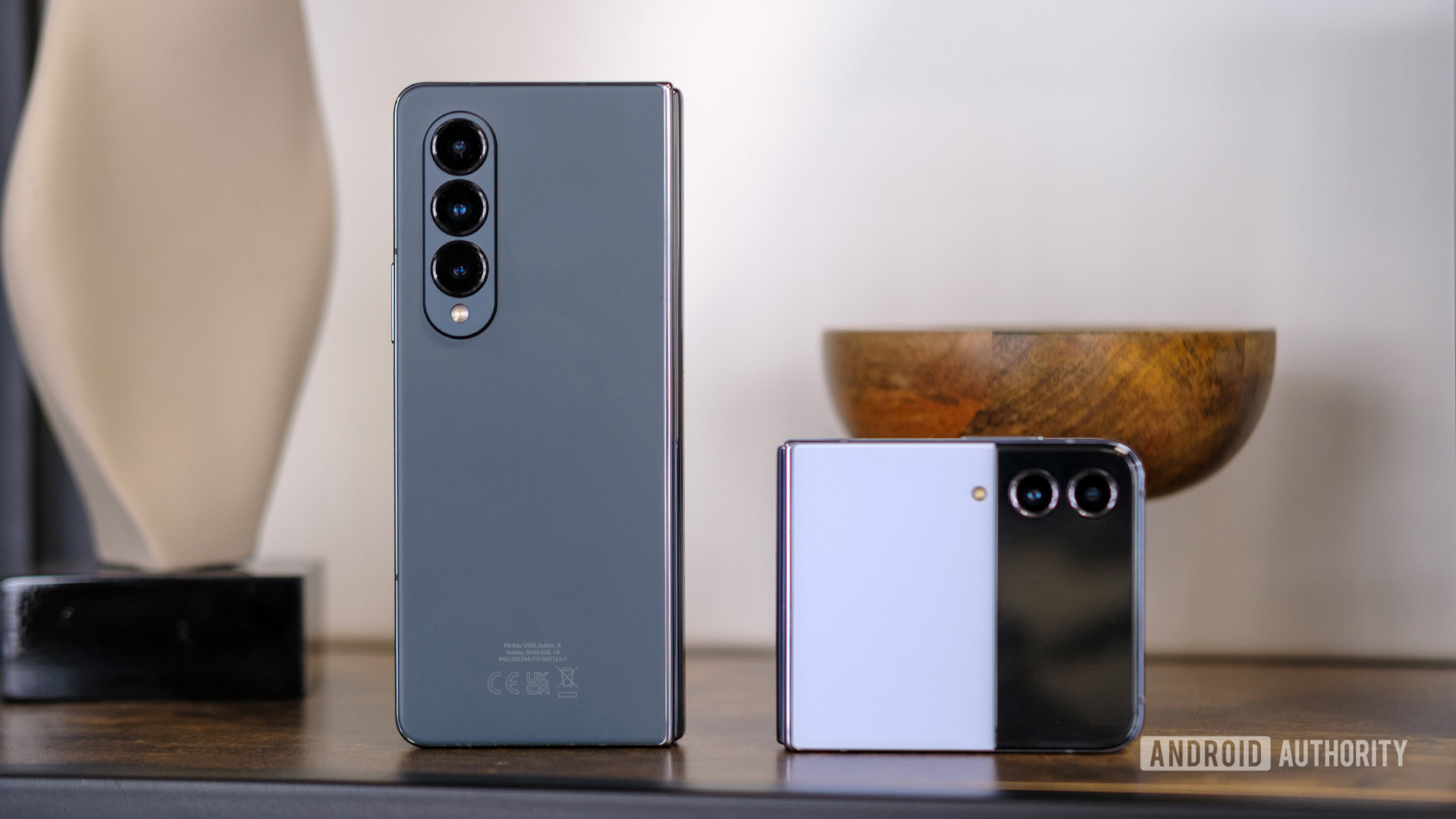Affiliate links on Android Authority may earn us a commission. Learn more.
I still don't want a foldable phone

Earlier this year, I revisited the Samsung Galaxy Z Fold 4, catching up with the phone six months after its release to see how things have held up. In that re-review, I gave the Z Fold 4 lots of praise. I even argued that, objectively, it is the best foldable phone you can buy today.
However, I must be honest: Once I was done with the Galaxy Z Fold 4, I put it back into storage. Despite being the best example of a foldable phone available, I still don’t want to use it daily. I’ve come to the conclusion that, for now, I have no interest in using foldable phones. Even when I have one for free, I’d rather not use it, to say nothing about actually spending my own money on one.
Assuming the pitchforks haven’t come out yet, let me explain my reasoning.
Foldable phones solve problems I don’t have

Although there are many unique things foldable phones can do, at their core, they allow users to have compact devices that get bigger. In the case of book-style phones, like the Galaxy Z Fold 4, you get a phone that can become a small tablet. With clamshell-style phones, like the Galaxy Z Flip 4, you get a standard-sized phone that folds up to become much smaller.
This flexibility solves a problem I simply don’t have. My current daily driver is a Google Pixel 7 Pro, and it is already too big for me. On a typical day, there is no point in which I wish I had a screen bigger than the 6.7-inch one already in my pocket. Likewise, despite its size, the Pixel 7 Pro fits in my pocket just fine, making the idea of a device that folds in half to become smaller (but thicker) less appealing.
Foldable phones appeal to certain kinds of people. I am not one of those people.
I understand that there are people out there who want this flexibility. A person who works in business and is constantly on the go might love a book-style foldable for looking at spreadsheets. Having more screen space could be a real boon to them. Video editors, social media producers, and even truck drivers could also use all that extra space for editing, multi-app layouts, and mapping apps, respectively. However, I don’t fit into any of these categories.
As a writer, anytime I feel like I need more screen space, I’m inevitably also going to need a full-sized physical keyboard. That need can only be addressed with a laptop or similar product, at least for now.
When I see a clamshell foldable, I see a device that adds an extra step before it becomes the phone I want it to be.
Elsewhere, clamshell-style foldables also have no purpose in my life. I can see some women really liking them since female-designed clothing and accessories often have no pockets or limited carrying space. Social media influencers might like them for their ability to be easily propped for selfies and group photos. Once again, I don’t fit into any of these categories. When I see a clamshell foldable, I see a device that adds an extra step before it becomes the phone I want it to be.
I could look past all this if foldable phones were just as good as “normal” phones in all other ways. Unfortunately, that’s not the case.
There are still too many sacrifices with foldables

With every new smartphone release, I am looking for three main things: better battery life, better durability, and lower prices. Foldable phones, by their very design, prohibit all three of these things (at least for now).
A foldable is going to have less room for the battery, thanks to the hinge. The foldable display will inevitably be less durable than a solid pane of tough glass. And, thanks to all the extra components and R&D investments, foldable phones are more expensive than slate phones with comparable specs and hardware. Barring any revolutionary design advancements, foldables are always going to be inferior to slate phones in the areas I care the most about.
I am not willing to sacrifice battery life, durability, and value just to have a phone that folds.
Another thing I want is for phones to be more compact. I’d love to see the power and hardware of a Google Pixel 7 Pro shrunk down into the chassis of a Pixel 7. That is my dream phone. I know what you’re thinking: A clamshell foldable should solve this. However, I don’t want compactness when the phone is folded up. I want that compact design when I’m using it in its full, unfolded state. I also don’t want a phone that’s twice as thick when I fold it up. Obviously, I also don’t want to deal with the battery life, durability, and price sacrifices, either, to say nothing of the camera spec deficiencies of a Galaxy Z Flip 4.
I know that clamshell foldables are getting larger, more powerful cover displays. The cover display of the OPPO Find N2 Flip is a perfect example. In theory, this should allow me to use most of the phone’s features without needing to unfold it. In my experience, though, this isn’t the case. Yeah, I can quickly check my notifications and the time, or even perform simple tasks, like snap a selfie. If I want to do anything more, though, I’ll need to unfold it. I can’t imagine typing a long text on a clamshell cover display. Even doing so on the Galaxy Z Fold 4’s cover display is uncomfortable because of how thick and heavy it is.
The TL;DR of this is that there are inherent aspects of foldables phones that make me uninterested in them. To earn my dollars, a foldable would need to not only overcome these issues but offer something even more to beat out a slate phone. And I still haven’t seen that killer feature, either.
Where is that ‘killer’ foldable feature?

Despite everything I’ve said so far, foldable phones are genuinely helpful in certain situations. Using two (or more) apps simultaneously on a foldable display — especially the large inner display of the Galaxy Z Fold 4 — is much better than anything a slate-style phone can offer. Unfolding a foldable halfway and propping it on a table for group selfies is also something that most traditional phones can’t do without a special case or accessory.
Versatility with gaming is also much better on foldables. Emulating a Nintendo DS or 3DS is a very obvious advantage foldables have. The large display of a Galaxy Z Fold 4 gives more space for on-screen controls, and the adjustable hinge of a Galaxy Z Flip 4 can make it easier to see your game in sunny environments. And, if you use a Bluetooth gaming controller, seeing your game in all its uninterrupted glory on the enormous Galaxy Z Fold 4 display could be worth the price of admission all on its own.
Foldables need an iPhone moment.
Despite these advantages, nothing I’ve listed here is something I can’t reproduce or closely replicate with a slate phone. Additionally, nothing here is so important or life-altering that I would say to myself, “OK, now I need a foldable phone.”
When I’ve talked about this with colleagues, the inevitable question I get is, “Well, what would be that killer feature?” Unfortunately, I don’t know. If I did, I’d be working for Samsung and leading its foldable division. I say that jokingly, but in all seriousness, I don’t think even Samsung knows what the killer feature of a foldable is. It certainly hasn’t gotten that across in any of its marketing. I also have yet to see anything that represents a true game-changer in the wild.
Basically, foldable phones need their iPhone moment. Until then, they’ll just be a novelty to me.
Foldable phones aren’t for me, but I’m glad they’re here

I like to think of foldables in a similar fashion as I think of experimental cinema. I love that filmmakers are out there testing new techniques, pushing the medium, and doing things we may have thought impossible only years earlier. However, as much as I’m happy they are doing this, I generally don’t want to watch experimental cinema. It’s difficult to find, slowly paced, and sometimes downright boring.
Foldable phones sit in a similar sphere for me. I really love that they exist. If Samsung gets its way, foldables could be the future, and the fact that we can taste that future now is exciting. The imminent release of the Google Pixel Fold will make the category even more interesting. But that doesn’t mean I actually want to own one of these devices.
I’m also really excited about more competition entering this space. The results will be universally good for consumers. We’ll have more options, lower prices, and faster innovation. This will not only make phones better but also more accessible to people who can’t spend $1,000+.
I’ll fully admit that, five or ten years from now, I might look back at this article and shake my head. Maybe I’m just not forward-thinking enough to understand why foldables are superior. Maybe foldable phones offer something truly visionary that I simply can’t see. But today, I’m happy with my boring old slate phone.